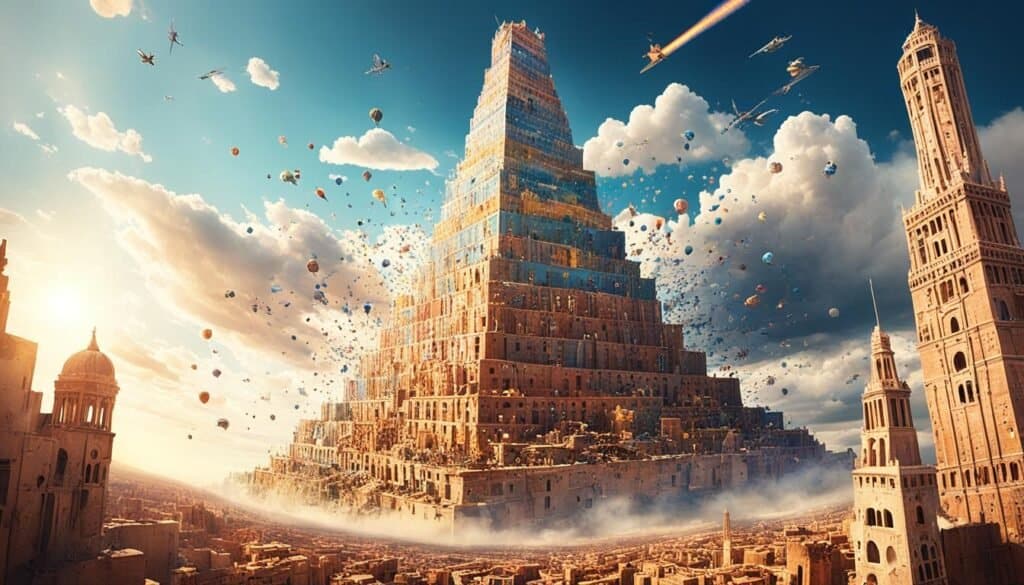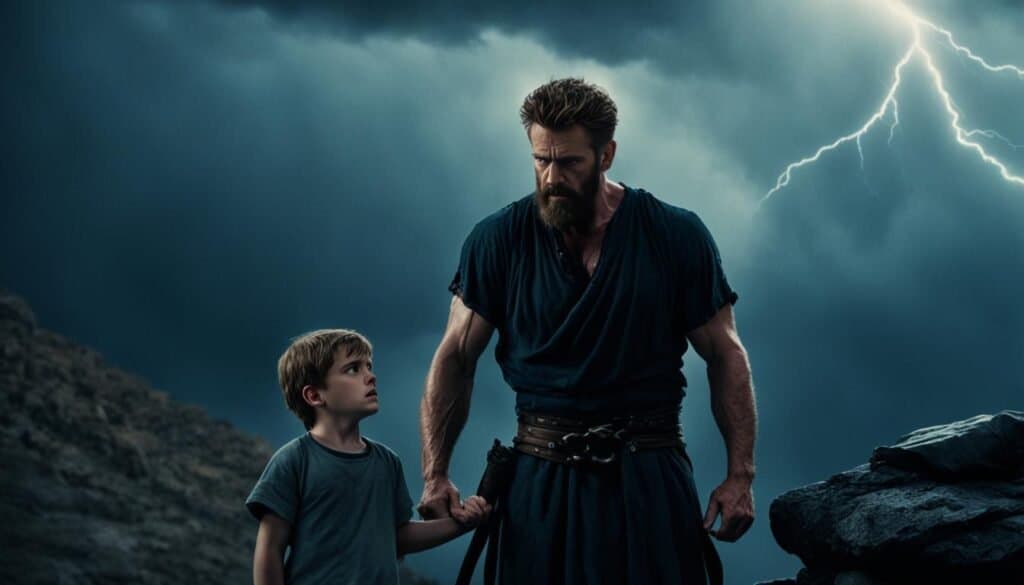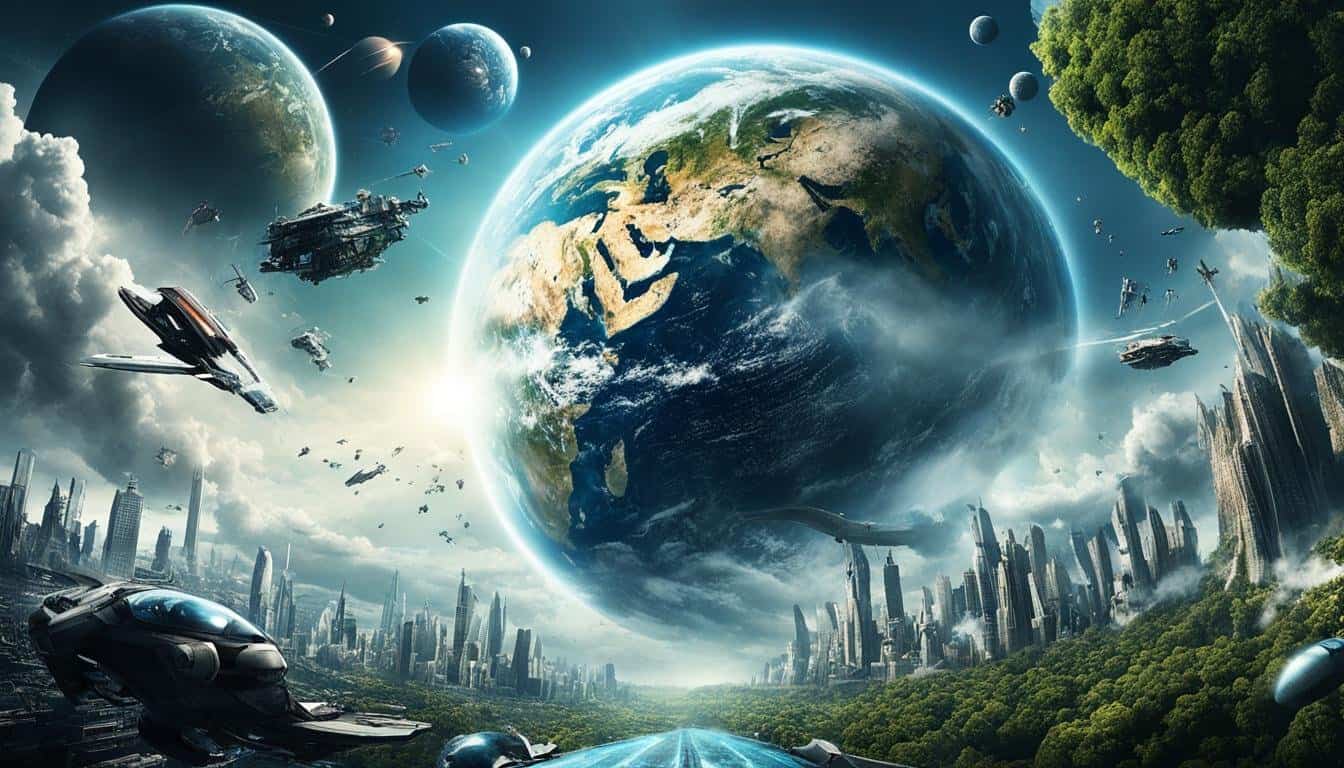In the Book of Genesis, we find stories that have really impacted how we see ourselves. Have you ever thought about what could’ve been if things were different? What if people made other choices or if big moments changed course? Let’s look at ten interesting “what if” questions that Genesis asks. They let us question what we think we know and imagine new answers.
Thinking about these “what if” questions makes us consider new paths for our world. We go from the start of humanity in the Garden of Eden to key moments in biblical lives. This journey shows us how powerful imagination is for creating different stories.
Key Takeaways:
- Explore ten intriguing “what if” scenarios from the Book of Genesis.
- Challenge conventional beliefs and ponder the consequences of alternate choices and events.
- Reflect on how different outcomes could have shaped the biblical narrative and human history.
- Marvel at the power of imagination in exploring uncharted territories within familiar stories.
- Gain new insights into the complexity and depth of the Genesis text.
What if the Tree of Knowledge Never Existed?
The Tree of Knowledge was key in the Garden of Eden story. But what if it was never there? Let’s think about a world without this tree. A world where humans were always innocent without the urge for knowledge.
In this world, there is no forbidden knowledge. Humans would live in paradise, always curious but never tempted. Their lives would be simple, yet filled with joy and peace.
But could this innocence last forever? Humans naturally want to learn and discover. Even without the Tree, this drive for knowledge would have been strong.
Our curiosity would lead us to seek wisdom by other means. Discovering the world’s secrets would become a quest. Through experimentation and observation, we would search for answers.
“Knowledge, in any form, is an integral part of the human experience. It is not a curse but rather a gift that allows us to grow, evolve, and better comprehend the world around us.”
Seeing the absence of the Tree as a chance changes things. In this view, not having the Tree would not stop us from learning. We would find different roads to wisdom.
Wanting to know and understand is a part of us. Our journey to wisdom may be different. But the goal would stay the same: to know and understand more.
The Tree of Knowledge in Popular Culture
The Tree of Knowledge has influenced popular culture a lot. It’s shown up in books, films, and art. It often talks about wisdom and the sometimes bad side of knowing too much.
| Book/ Film | Description |
|---|---|
| “Brave New World” by Aldous Huxley | In this dystopian novel, the pursuit of knowledge and free thought is suppressed to maintain societal stability. |
| “The Matrix” directed by the Wachowskis | The film delves into the theme of awakening to the truth beyond the confines of perceived reality, analogous to taking a bite from the Tree of Knowledge. |
| “Prometheus” directed by Ridley Scott | This science fiction film explores humanity’s search for knowledge and the unintended consequences that follow. |
What if Eve Hadn’t Eaten the Forbidden Fruit?
If Eve had not taken a bite in the Garden of Eden, imagine the world around us. Would it have stayed a perfect place, free from all harm, or would it have missed out on becoming what it is today?
Eve’s act changed everything, some say leading to humanity’s fall. It brought in suffering and sin, changing our history forever. But, what if she had resisted, staying faithful?
Maybe, paradise would have lasted, and everyone would live in peace, with no issues or pain. The Garden of Eden could have been a testament to our purity and harmony with nature.
But, consider what might have been lost in such a perfect world. Would we have the drive to learn and grow without the fruit’s knowledge? Would we miss out on the amazing progress we’ve seen?
Paradise, sure, but our quest for knowledge sparked incredible progress. From new sciences to advanced technology, our curiosity led us forward. Without that initial spark, could we have ever discovered so much?
“It is through our curiosity and desire to explore that we have made astonishing leaps forward in science, medicine, technology, and countless other fields.”
We are left with hypotheticals. We’ll never know what would have happened if Eve had chosen differently. Our world today mixes sin and progress in a complex way.
Yet, as we ponder the past, we learn valuable lessons. The story of Eve tells us about the power of choice and its effects. It warns us about maintaining a careful balance.
This balance is crucial. We must seek wisdom without losing our purity. The dance between gaining knowledge and preserving innocence is where we find our truth.

| Paradise without Sin and Suffering | Progress and Innovation | |
|---|---|---|
| Advantages | – Blissful harmony – Utopian existence – Unspoiled paradise |
– Advancements and achievements – Breakthroughs and discoveries – Scientific and technological progress |
| Disadvantages | – Potential stagnation – Lack of growth and development – Limited knowledge and understanding |
– Sin and suffering – Challenges and obstacles – Ethical dilemmas and moral complexities |
What if the Serpent Was a Noble Creature Offering Wisdom?
In the Garden of Eden, the serpent is usually seen as tricky and sly. It is known for tempting Eve with the forbidden fruit. This act is said to have led to the downfall of humanity. But, what if the serpent meant well? What if it was actually offering valuable insight, not evil?
Think of a serpent eager to share knowledge and promote understanding. Instead of tricks, it would offer Adam and Eve wisdom, urging them to learn more about the world.
With their new wisdom, Adam and Eve could have learned much faster. This would have sped up human progress. Just imagine the amazing things we could have achieved. Our understanding of the world would be much deeper. Our society would value knowledge and growth more than anything.
“Through the serpent’s guidance, humanity would have been empowered to seek knowledge, rather than being burdened with the consequences of forbidden fruit. We would have embraced the wonders of the world and expanded our understanding of the universe.”
A world where a serpent is a teacher would lead to a very different society. This serpent would symbolize wisdom and not deceit. It would guide us towards working together and learning more.
But, there might also be some problems in this perfect scenario. Would we have been prepared to learn so quickly? Could the serpent’s advice have led to problems we weren’t ready for? These are tough questions that highlight the balance between what we know and what we should learn.
What if the Flood Never Happened?
In the Book of Genesis, the Great Flood is a topic of much discussion. Imagine if the flood never took place. What would this mean for us?
The flood has been viewed as punishment from above. It cleaned the slate for human society, getting rid of a corrupt world. Noah’s family, however, found a new beginning because of it. But, would we learn the lessons we did from the flood without it?
One thing to think about is population control. The flood may have been nature’s way of keeping the human count in check. By saving Noah’s family, God showed there was still hope for us.
Without the flood, unchecked growth in people could’ve led to serious problems. As more people appeared, there would be fewer resources to share. This may have caused fights over land and food.
Running out of resources would have been a big worry. More people would mean needing more from our planet. But the Earth has only so much to give. This would lead to many hard problems for everyone.
Also, without the flood, we’d miss its moral teachings. It’s a story that warns us about our actions, reminding us to be good stewards of the earth. It teaches the powerful message of living responsibly and protecting our environment.
In a world without the flood, humanity might have faced a different kind of disaster: one caused by the devastating repercussions of unchecked population growth and resource depletion.
Alternate Scenario: A World Ravaged by Unchecked Population Growth and Resource Depletion
Imagine a world where people just kept growing without any big happenings. Let’s imagine what that might be like.
| Consequences of Unchecked Population Growth and Resource Depletion | Potential Outcomes |
|---|---|
| Insufficient resources to support the growing population | Food shortages, malnutrition, and famine |
| Increased competition for land and territories | Conflicts, wars, and social unrest |
| Environmental degradation due to excessive resource extraction | Loss of biodiversity, deforestation, and climate change |
| Strain on infrastructure and public services | Inadequate healthcare, education, and housing |
In a flood-less world, we might face a very different crisis. Too many people and too few resources could lead to war and environmental ruin.
Looking at these “what if” scenarios can remind us of ancient stories’ wisdom. They offer important guidance for how to live in our world, encouraging us to act wisely and consider our impact on the planet.
What if the Tower of Babel Had Been Completed?
In the biblical story, the Tower of Babel shows humans wanting power and to raise themselves. But imagine if it was done. Would it lead to a world where everyone ruled together, or would it cause more problems and split us apart more?
If the Tower of Babel was completed, it could have united the world under one government. This massive tower would show off what people can do. It would bring different groups together, sharing what they know and have to reach a common goal.
A global government might have made nations work better with each other. It could have broken down barriers like language and culture. This might have made the world feel closer and more peaceful.
But completing the tower might have backfired too. All that power in one place could turn to oppression. Leaders could have used their power to control and harm people, making life hard for everyone.
“Power tends to corrupt, and absolute power corrupts absolutely. Great men are almost always bad men.”
Finishing the Tower could have made things worse for us. It was a symbol of going against God and wanting to be like gods ourselves. So, God broke connections and scattered people worldwide. This breakup helped form the many different cultures and nations we see today, adding beauty to the world.

Embracing Unity with Caution
The Tower of Babel tale warns us about joining forces for the wrong reasons. It tells us to work together with respect and understanding of each other’s differences.
The story, while not real, makes us think about how we should live together. Maybe what we should aim for is to appreciate each other’s cultures, work together, and still be free and equal.
What if Abraham Hadn’t Been Willing to Sacrifice Isaac?
In the Bible, Abraham faces an intense test from God. He’s asked to offer his beloved son, Isaac, as a sacrifice. This moment shows Abraham’s strong faith and trust in God. It also hints at Jesus Christ’s sacrifice for our sins in the future.
Abraham’s act of offering Isaac shows his loyalty and love for God. It seals a promise between Abraham and God. This promise includes blessings for his family and the story leading to the birth of Jesus.
Imagine if Abraham refused to sacrifice Isaac. The entire story of God’s covenant with Abraham could have changed. This promise was crucial for bringing Jesus into the world. Without it, things might have gone very differently.
This story isn’t just about Abraham and his descendants. It’s a lesson for all who believe. It reminds us about the power of faith, obedience, and trusting God’s plan. This makes us think about our own commitment to God.
Abraham’s tale shows the depth of his faith and love for God. It encourages us to look at our relationship with God. How much are we willing to do for that connection? Just like Abraham, our faith can lead to great blessings.
Abraham’s Sacrifice of Isaac in the Context of Biblical History
Abraham’s sacrifice is a pivotal part of the Bible’s overall story. It helps set the scene for Jesus Christ’s coming and God’s plan to save us.
“By faith Abraham, when God tested him, offered Isaac as a sacrifice. He who had embraced the promises was about to sacrifice his one and only son, even though God had said to him, ‘It is through Isaac that your offspring will be reckoned.’ Abraham reasoned that God could even raise the dead, and so, in a manner of speaking, he did receive Isaac back from death.”
(Hebrews 11:17-19 NIV)
Abraham’s sacrifice shows his unwavering faith. It also hints at God’s own sacrifice, giving Jesus Christ for us. This shows how much God loves us and the power of sacrifice to save.
Imagine if Abraham didn’t agree to sacrifice Isaac. This thought makes us see the huge impact of Abraham’s choice on the Bible’s story. Through his faith, God’s plan to redeem us starts. This leads to Jesus, our Savior.
| Table: The Significance of Abraham’s Sacrifice |
|---|
| 1. Solidifies the covenant between Abraham and God |
| 2. Ensures the multiplication and blessings of Abraham’s descendants |
| 3. Foreshadows the ultimate sacrifice of Jesus Christ for humanity’s sins |
| 4. Demonstrates the importance of faith, obedience, and trust in God |

To end, think about what if Abraham hadn’t sacrificed Isaac. This question makes us see how vital Abraham’s faith was. It teaches us about faith, obedience, and trusting God. As we learn from Abraham’s story, may we too trust in God fully. We believe that through faith, we can enjoy God’s many blessings and His deep love that redeems.
What if Joseph Hadn’t Been Sold into Slavery?
Let’s think about what could have happened if Joseph wasn’t sold into slavery. This hypothetical situation helps us understand the Israelite’s history better. It also sheds light on how the Exodus came to be.
Joseph, Jacob’s favorite son, faced a terrible twist of fate. His brothers, jealous of him, sold him as a slave. But, what if they hadn’t?
If Joseph wasn’t sold, the Israelites might have never gone to Egypt. His ability to explain Pharaoh’s dreams got him a top job in Egypt. This high position eventually brought his family there during a famine.
Their arrival in Egypt was a key step. It led to their later slavery and the famous Exodus with Moses. So, everything from Joseph’s sale changed the future of the Israelites forever.

Think about it, if Joseph stayed in Canaan, the Israelites’ story would be very different. They might not have gone through slavery in Egypt or the Exodus. The whole history could have changed by a simple act of not selling him.
This “what if” tale shows how biblical events are tied together. It shows the big impact that small choices, like selling Joseph, can have. These events, big and small, knit together to form history and God’s plan.
How Do the “What If” Scenarios in Genesis Relate to Conflict Resolution Examples?
The “What If” scenarios in Genesis illuminate profound lessons in conflict resolution. By analyzing pivotal moments, we can extract valuable insights. The narratives serve as powerful examples of resolving conflict in genesis, showcasing how patience, communication, and forgiveness can transform adversities into opportunities for reconciliation and understanding among individuals.
What if the Plagues of Egypt Had Been Less Severe?
We are looking at a twist in the Book of Genesis. Imagine, what if the plagues of Egypt had not been so intense? This change could deeply alter the history of the Israelites.
Less severe plagues might have led Pharaoh to let the Israelites go sooner. But their slavery could have also continued, causing more pain and struggle. It’s a moment in history full of what-ifs.
Reflecting on this possibility shows us the power dynamic between Pharaoh and the Israelites. The plagues pushed for a change. They tested Pharaoh’s control and gave the Israelites new hope and strength.
Though the exact result is up for debate, we know the plagues were key to the Israelites’ freedom and the Exodus. By thinking about what could have been, we understand more about the big story and the impact of these key events.
Affiliate Disclosure: "As an Amazon Associate I earn from qualifying purchases made from links in this post. We are a participant in the Amazon Services LLC Associates Program, an affiliate advertising program designed to provide a means for us to earn fees by linking to Amazon.com."

